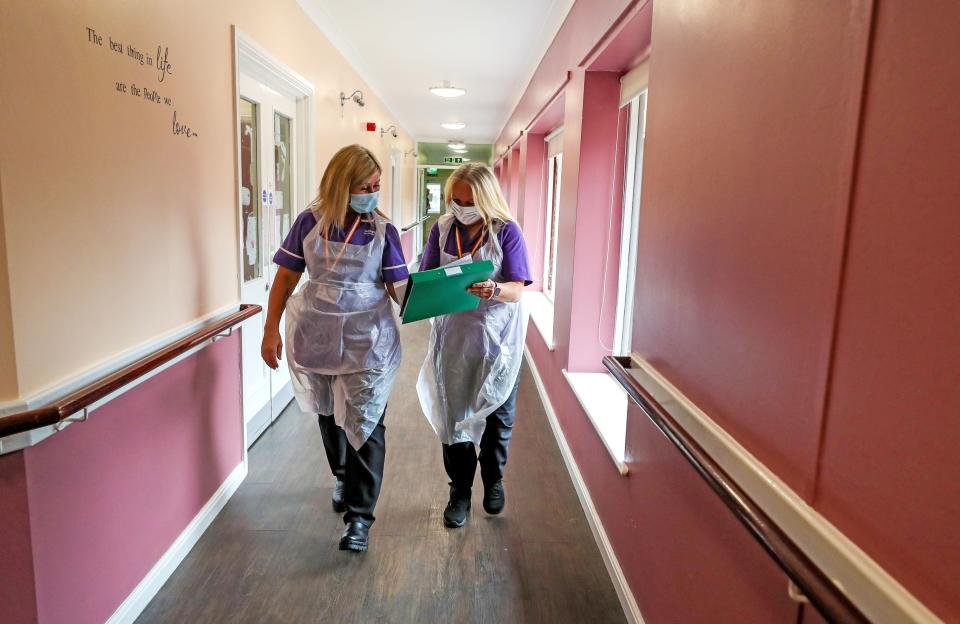Covid vaccines for carers may become compulsory after government review

Care home staff will be required to have a vaccine under government plans
(PA)Ministers plan to force care home workers to have a coronavirus vaccination as a condition of their employment, the Department of Health and Social Care (DHSC) has said.
The DHSC has launched a consultation on the plans which will effectively make Covid-19 vaccinations mandatory for staff working in care homes with older residents.
The government believes it would protect vulnerable residents from the virus.
NHS workers will not be included in the plans which will also only apply to resident care homes looking after elderly people. This means care homes for younger disabled and vulnerable adults will not be included, nor will home care services.
Experts on the government’s Scientific Advisory Group for Emergencies say 80 per cent of staff and 90 per cent of residents in care homes need to be vaccinated to provide a minimum level of protection, but that only 53 per cent of homes in England are meeting those targets.
This could leave up to 150,000 residents in care homes at increased risk, the DHSC said.
It warned the current staff vaccination level was below 80 per cent in 89 separate local authority areas and across all 32 London boroughs.
There are 27 local authority areas where staff vaccination uptake is below 70 per cent.
If one-quarter of care home staff covered by the policy went unvaccinated, that would equate to about 85,000 people. It is feared that a requirement to be vaccinated could encourage some frontline workers to leave the sector completely, exacerbating existing widespread shortages. The care sector already has more than 120,000 vacancies and tough requirements on immigration.
In many areas care homes compete for staff against local employers such as supermarkets who pay above the minimum wage. Persistent poor funding of social care means most staff are paid at the minimum wage only.
Unison general secretary Christina McAnea said: “Boosting the number of vaccinations in the social care sector is essential for everyone’s safety. But mandatory jabs are the wrong approach and a massive distraction.
“Too heavy-handed an approach could backfire badly. Some staff may simply up and go, leaving a poorly paid sector already struggling with thousands and thousands of vacancies in a terrible state. That could damage the quality of care for the elderly and vulnerable, and no-one wants that.”
Martin Green, chief executive of Care England, said the sector was divided over the issue of compulsory vaccinations but added: “Should the vaccine be mandatory for adult social care staff working in care homes for older people it begs the question whether it should not be mandatory for the NHS, those working in other care home settings, supported living, hospices, et cetera as well.”
Ministers have launched a five-week consultation on the plans, which will be enforced by making it a requirement of care home companies to only employ workers who have received a Covid-19 vaccination.
Anyone who is medically exempt will be excluded from the requirement and the DHSC said some companies were already requiring their staff to get vaccinated.
NHS England has said all eligible care homes have been visited and vaccines offered to staff and residents, with the vast majority of homes having had repeat visits.
Some firms have already introduced the requirement for staff including Barchester Healthcare, which runs more than 200 care homes across the UK.
Its chief executive, Dr Pete Calveley, said: “Barchester believes the vaccination programme has transformed the outlook for the vulnerable residents in older people care homes, a significant proportion of whom will not acquire full immunity despite being vaccinated.
“We have not lightly introduced our vaccine policy, but we take the view that providing safe care for those we care for is our paramount obligation.
“As the chief medical officer has said, it is a professional duty for care home staff to accept the vaccine unless there is a medical reason they should not.”
Matt Hancock, the health secretary, said: “Older people living in care homes are most at risk of suffering serious consequences of Covid-19 and we have seen the grave effects the virus has had on this group.
“Making vaccines a condition of deployment is something many care homes have called for, to help them provide greater protection for staff and residents in older people’s care homes and so save lives.
“The vaccine is already preventing deaths and is our route out of this pandemic. We have a duty of care to those most vulnerable to Covid-19, so it is right we consider all options to keep people safe.”
Read More
Moderna vaccine given to patients in UK
Compulsory vaccines planned for carers - follow live
More than 80 long Covid clinics to be opened by NHS in England

 Yahoo Finance
Yahoo Finance 